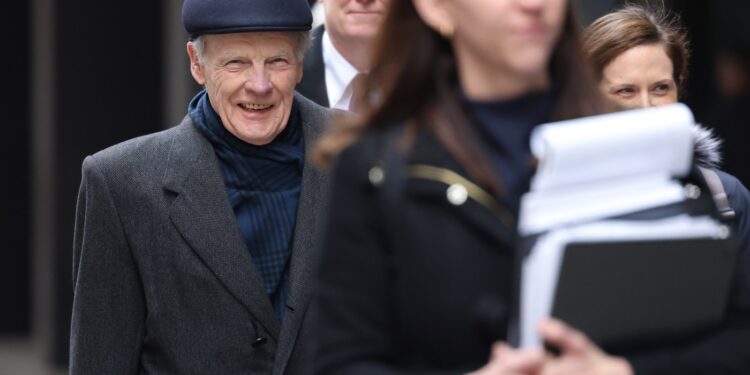
Former House Speaker Michael Madigan is expected to face a tough cross-examination by prosecutors in his federal corruption trial Monday, in what promises to be a defining moment in the landmark case.
Madigan, 82, has been on the witness stand since last Tuesday and so far has faced mostly sympathetic questioning from his own attorney, taking the jury through his strict upbringing and rise to power, while emphatically and repeatedly denying he ever abused his public office for private gain.
But Monday will shift to cross-examination by a seasoned prosecution team that has now had a week to prepare.
Before the questioning begins, U.S. District Judge John Robert Blakey is slated to hear arguments on just how wide-ranging the government’s questioning can be, including several areas of inquiry that had been previously barred by the judge as irrelevant or too prejudicial for the jury.
Among them: Madigan’s allegedly fractured relationship with former McPier boss Juan Ochoa, whom Madigan later recommended for a cushy seat on ComEd’s board of directors.
Madigan testified Wednesday that he mended fences with Ochoa at some point after Ochoa fired a former Madigan staffer at then-Gov. Rod Blagojevich’s request. But Assistant U.S. Attorney Amarjeet Bhachu said that was far from the full story.
“That lends emphasis to this idea that Mr. Madigan avoids confrontation, is conciliatory,” Bhachu argued in court Wednesday after the jury had gone home for the day. In fact, Madigan retaliated by blocking debt-restructuring legislation that McPier badly needed, Bhachu said.
Bhachu also wants to show jurors portions of a 2009 interview Madigan gave about the patronage system under former Mayor Richard J. Daley, in which Madigan described giving people jobs in exchange for political work in the 13th Ward.
Blakey barred the evidence in a pretrial hearing. But Bhachu said Madigan opened the door by testifying that his ward office was “a mecca,” leaving the impression it was some “shining beacon on the hill where people would come for help.”
Specifically, Bhachu said he wants to ask Madigan whether he knew that Jeffrey Rush, one of the people whom he wanted to help with a job, had been convicted of three felonies and that three women had been the “subject of that misconduct.”
Rush, the son of longtime U.S. Congressman Bobby Rush, had worked for the Illinois Department of Corrections but got in trouble for having a sexual relationship with a parolee.
Collins objected, saying, “I don’t see how asking a bunch of questions that dirty up Mr. Rush in an attempt to dirty up Mr. Madigan are relevant.”
Madigan, a Southwest Side Democrat, and his longtime confidant, Michael McClain, 77, of downstate Quincy, are charged in a 23-count indictment alleging that Madigan’s vaunted state and political operations were run like a criminal enterprise to amass and increase his power and enrich himself and his associates.
In addition to alleging bribery schemes involving ComEd and AT&T Illinois, the indictment accuses Madigan of pressuring developers to hire the speaker’s law firm and trying to win business by secretly supporting legislation to transfer state-owned land in Chinatown to the city so developers could build a high-rise.
Both Madigan and McClain have denied wrongdoing.
The trial, which began with jury selection Oct. 8, is heading into its 12th week of testimony. The judge has told the jury he hopes they will begin their deliberations on the week of Jan. 27, though Madigan’s surprise testimony could push that back even further.
Madigan’s decision to testify in his own defense is rare in high-profile corruption trials and is fraught with risk. Even in his direct testimony, the tightrope Madigan was walking became obvious: Trying to explain his own words in some of the secret recordings at the center of the case while attempting to pawn off many of the more damaging episodes on McClain.
By testifying, Madigan has been able to portray himself as a non-confrontational consensus builder, far from the ruthless and all-powerful boss alleged by prosecutors He’s also provided a compelling backstory of a blue-collar, Irish Catholic kid who rose to the pinnacle of Illinois power politics through work ethic and moxie.
At the same time, Madigan’s testimony has opened the door to other previously barred evidence — including a potentially damaging wiretapped call where the speaker and McClain allegedly laugh about some of their political associates making out “like bandits.”
That tape had been previously barred by Blakey, but the judge ruled Wednesday it can now come in to counter Madigan’s claim that he was “angry” when he found out his associates had been granted do-nothing contracts by ComEd and AT&T.
jmeisner@chicagotribune.com
Originally Published:







